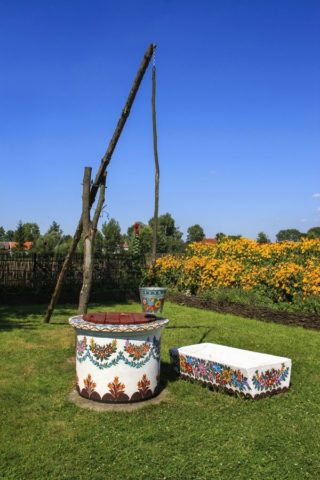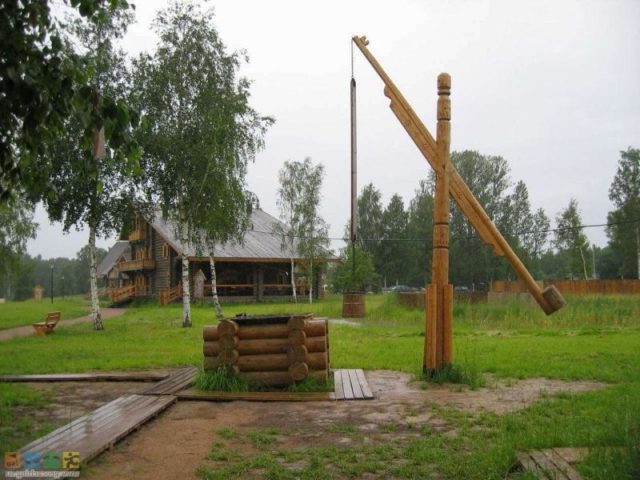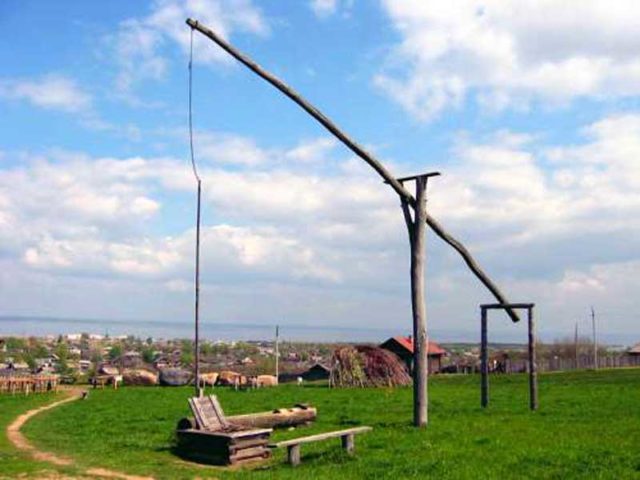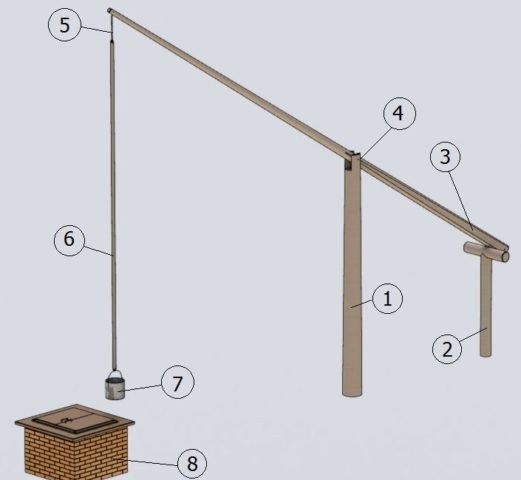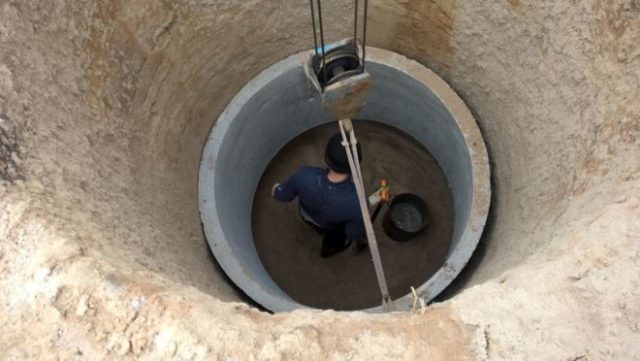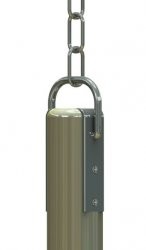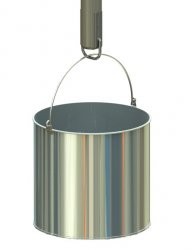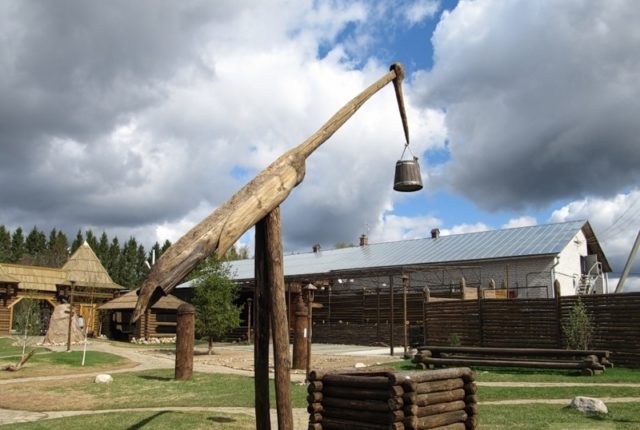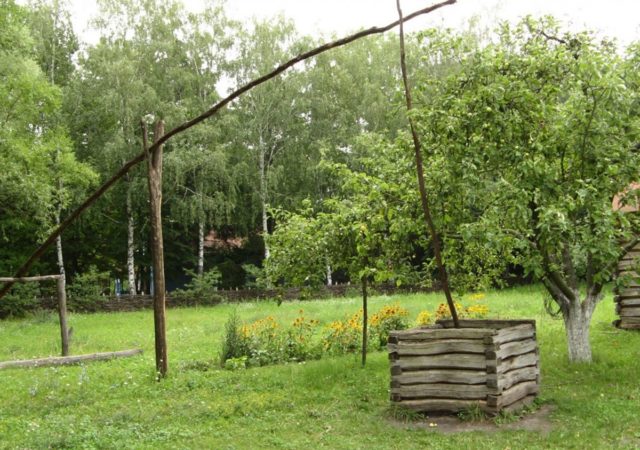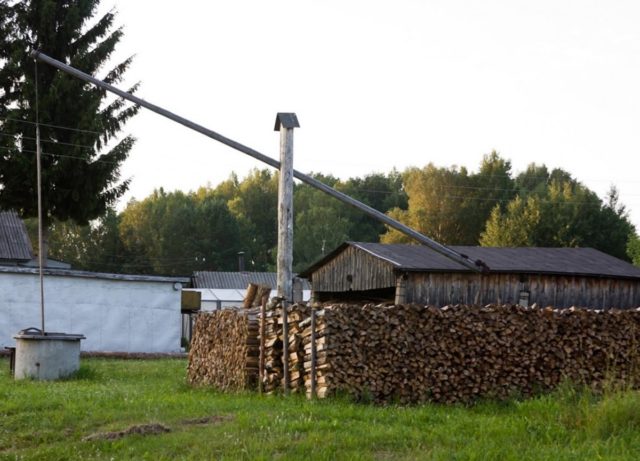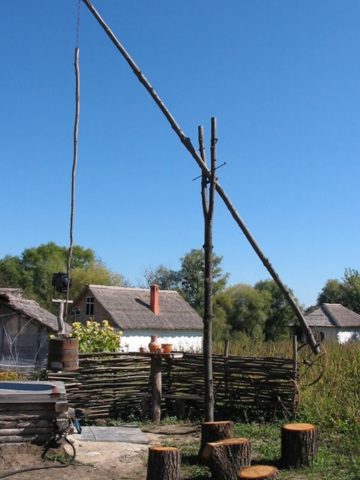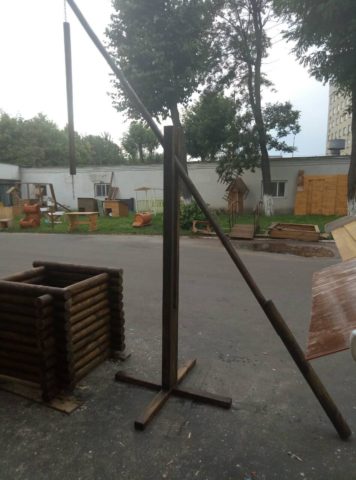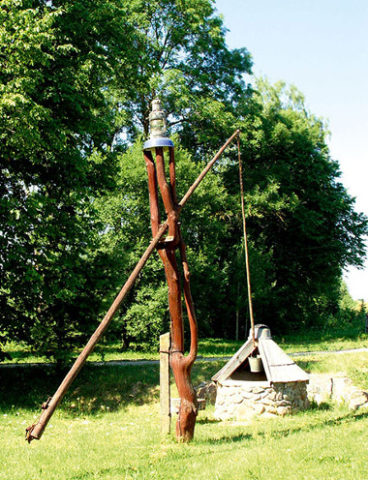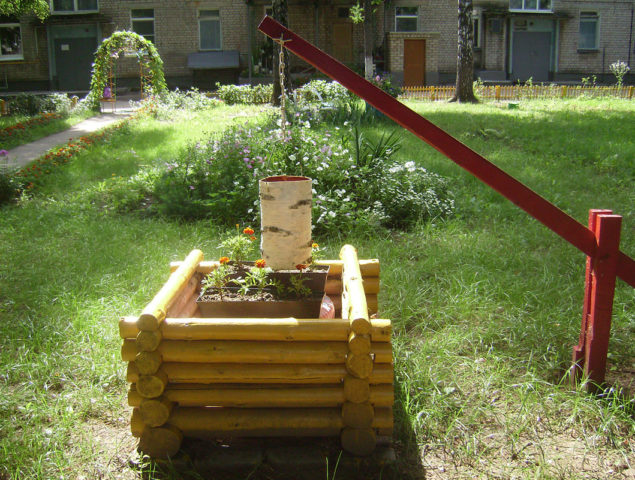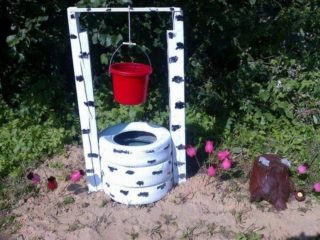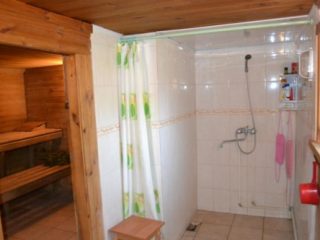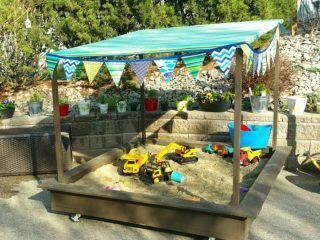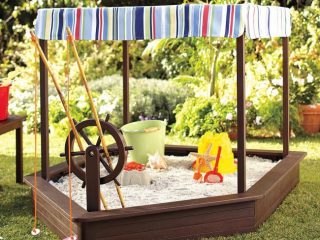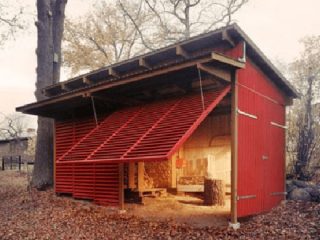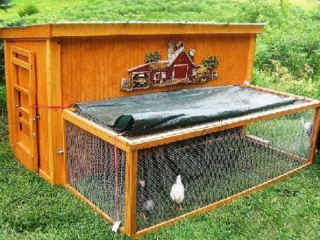Content
A well on the site is a practical and convenient option for arranging drinking water access to the house and garden. With proper execution and imagination of the master, a well-equipped ground part of the well becomes a decoration of the landscape. There are many ways of external construction, which not only fulfill a practical function, but also become an attraction of the site, as can be seen in the photo of the crane well.
What is a crane well
Of the variety of methods for arranging the external part of the water intake on the site, the crane well is perhaps the most romantic and at the same time functional tool for facilitating the rise of groundwater. It differs from all other structures only in the lifting mechanism, which looks like a crane because of the long movable well arm. It is fixed on a base fixed to the ground. A bucket is fixed to one side of the rocker arm, and a heavy counterweight to the other side, which allows you to raise the container with water with a slight movement of your hand. Before making a choice in favor of this device, you should familiarize yourself with its features.
Advantages of a crane well
The main advantage of the design is ease of use. A bucket of water can be lifted with little or no physical force, unlike a standard well gate, which involves rotating a drum with a heavy bucket suspended. Due to this factor, the time for water extraction is significantly reduced. In addition to simple practical use, the crane well makes the design of the entire site completely different. The unique spirit of antiquity in the form of a well-crane will naturally fit into any landscape.
Disadvantages of a well with a crane
For those who need to get water from the deepest layers of the soil, such a device will not work. It is considered optimal that a crane draws water at a depth of 4-5 m.When increasing the length of the well, the boom of the crane will also lengthen, and this entails an increase in the free area for the lever to move on the site, which is not always justified. Also, the forced increase in strength due to the lengthening of the rocker arm will give the entire structure a bulky character.
Another significant drawback, many users consider the impossibility of tightness of the head in the construction of the crane. Due to the vertical movement of the pole with the bucket, there is no way to make a house above the mine. The need for such access to the well makes it necessary to cover the water with a removable cover or even leave it open. This often leads to contamination of the liquid with small debris, leaves or sediments.
Despite some features of the well-crane, it can be used by a person of any age and constitution due to the simplicity of the design. Its appeal is not only in the ease of water extraction, but also in the pleasant emotions that the crane causes in people, as in this video.
Crane well device
The construction of a crane well is simple and consists of several parts.
Each part of the structure has a specific function:
- The vertical base is a thick support leg anchored in the ground. This is the most durable part of the crane well, it is firmly fixed into the ground at a distance from the head according to calculations.
- The counterweight support is a kind of travel stop, in most models it is not necessary to install it.
- Short arm with counterweight - a heavy load attached to the short side of the boom. It acts as a ballast to balance the human strength and the weight of the bucket of water when it is lifted.
- Rocker (boom) - a lever that is attached to the base using hinges or corners. Usually it is made from a solid, non-thick log, pipe or sturdy pole.
- Chain - the fastening part of the boom and pole, usually galvanized links are used.
- The pole is fixed to the long part of the boom with a chain and corresponds to the depth of the well.
- A container for collecting water - a bucket or tub.
- The head of a well-crane is the outer surface of the well with a round or square shape. It protects water from pollution and freezing. It is usually made from stone, concrete ring, brick, planks or beams.
The mine itself - the underground part of the well, which is filled with water, is formed at the place of occurrence of groundwater. As a rule, inside it is lined with concrete rings or lumber.
Previously, in villages, a fork in a thick tree was chosen as a support, to which a lever with a bucket was attached. If there was no suitable tree near the well, it was dug out of the forest and planted next to the well shaft as the basis for the rocker arm. Now there is a large amount of solid material for the construction of the base and convenient fasteners for fixing. This allows you to make a do-it-yourself crane on the site without problems, if there is a functioning mine and a head.
How to make a crane for a well with your own hands
The construction of a crane for a well includes several stages of work. Competent calculation, adherence to all technological processes and step-by-step implementation of the plan will make it possible to become a well with a crane not only a place for collecting water, but also a pleasant addition to the landscape.
Material preparation
To make a crane with your own hands, you need to prepare the necessary materials:
- wooden bars with sections 5 * 10 and 5 * 5 cm;
- support pipes;
- thin duralumin pipe;
- self-tapping screws;
- chain;
- corners;
- mounting studs M 10 and M 8;
- bucket load;
- concrete solution;
- two metal bars.
When forming the structure, you will need the following devices and tools:
- garden drill;
- sandpaper;
- wrench;
- screwdriver;
- shovel.
Crane calculation
The parameters of the lever, as well as the location of the support part, depend on the depth of the well. The approximate dimensions can be found in the table.
When calculating all the parameters of a well crane, simple formulas are used. For ease of understanding, each indicator is indicated by letters:
- H is the depth of the mine;
- L - pole with chain;
- h1 - rack height;
- l1 is the length of the large lever arm;
- l2 is the length of the small shoulder;
- h2 is the distance from the main strut to the center of the well.
To determine the main indicators, the following formulas are used:
- h2 = H - 0.7 m;
- h1 = H / 2 + 2.4 m;
- L = H + 150 cm;
- l1 = H - 0.2 m;
- l2 = H - 0.8 m.
When measuring the depth of the well, it is necessary to take into account the factor that when taking water, the bucket should not sink closer than 30 cm to the bottom of the shaft. With an average well depth of 5 m and a water tub volume of 8-10 liters, you need to rely on a counterweight on the short side of the sleeve weighing at least 15 kg. A more accurate weight of the load is determined empirically during the installation of the well crane.
Installing the crane support
Before installing the base at the distance chosen according to the formula from the well, it is necessary to isolate it from contact with the ground. To do this, pipes are attached to the main beam with mounting studs, which will become a continuation of the base in the ground. After that, dig or drill a hole 1 m deep with a garden drill. The width should be such that, after installing the pipes, there is a distance of 20-25 cm between them and the ground.A support is installed in this hole so that about 15-20 cm remains from the wooden base to the soil. The pipes are leveled, the hole is concreted.
Balancer installation
The installation of the crane balancer for the well can be started only after the solution has completely solidified. A beam of 50 * 50 cm, which goes to the boom, is strengthened at the point of fixation to the support with an overlay of a bar of wood of the same thickness. The boom is fixed to the support by means of a pair of steel corners and an M10 mounting pin. The corners are attached to the rack with M8 studs.
Hanging a pole with a bucket
One of the best options for a pole that holds a bucket is a duralumin pipe 2.2 m in size.It is pasted over with a moisture-resistant film to avoid corrosion.
The tube is attached to the long end of the balancer with a meter chain.
A 0.5 m chain with a bucket is fixed to the other side of the pole.
A load is placed on the top of the bucket, which will force the container, upon contact with water, to turn over and go to the bottom.
Installing the counterweight
The last to attach to the crane is the counterweight on the short side of the balancer. Two iron bars, giving a total weight of 15-18 kg, are attached with mounting pins to the boom. After complete assembly of the structure, the exact weight of the balancer is established by checking the lift of the bucket of water.
Crane design
A do-it-yourself decorative well, a crane in the country, will become a full-fledged design element of the landscape of the site. For a beautiful design, you need to take into account other buildings and components of the local area.
To decorate the supporting part of the crane, a flower bed is dug around it. Fertilize it with humus and plant climbing plants. For example, a simple bean will decorate the support of a crane with beautiful flowers, wrapping around the base.
The design of the ground part in the form of a crane is a popular option for this type of well.
In addition to the famous bird, to match the name of the well, it is often decorated in the form of other living creatures: giraffe, fox cub, elephant calf, stork.
Children will love the performance of the crane well in the form of fairy-tale characters or cartoon characters.
Tips & Tricks
When constructing a well crane with their own hands, experienced craftsmen recommend that you carefully follow the safety rules:
- All materials used in the structure must be checked for integrity and suitability for long-term use. Discard elements with cracks, signs of deformation and other damage.
- Before installation, the lever itself is checked as follows: they install it at a low height and hang the load on the long edge. With a weighting equal to the sum of a bucket of water, a pole and chains, the deformation of the lever should not exceed 5% of its length.
- The chains and pole are separately checked for strength. For this, a load is suspended, twice the weight of the container with water.
- Near the well, the crane removes all objects and landings that interfere with the free movement and movement of the rocker arm.
Photo of wells-cranes
As a rule, hand-made cranes wells naturally fit into the natural landscape of the site.
There are ready-made models that can be purchased at carpentry workshops and installed in the country.
Sometimes the simplest decor turns a composition into an original design project.
The very idea of a crane well can be implemented on the site in the form of a landscape decoration without the functionality of a set of water.
Conclusion
Photos of a well-crane will help to realize the idea of an old way of collecting water in the country. Compliance with the principles of the device, the correct calculation and the imagination of the master allows you to competently equip the landscape of the site with the help of a well crane.
